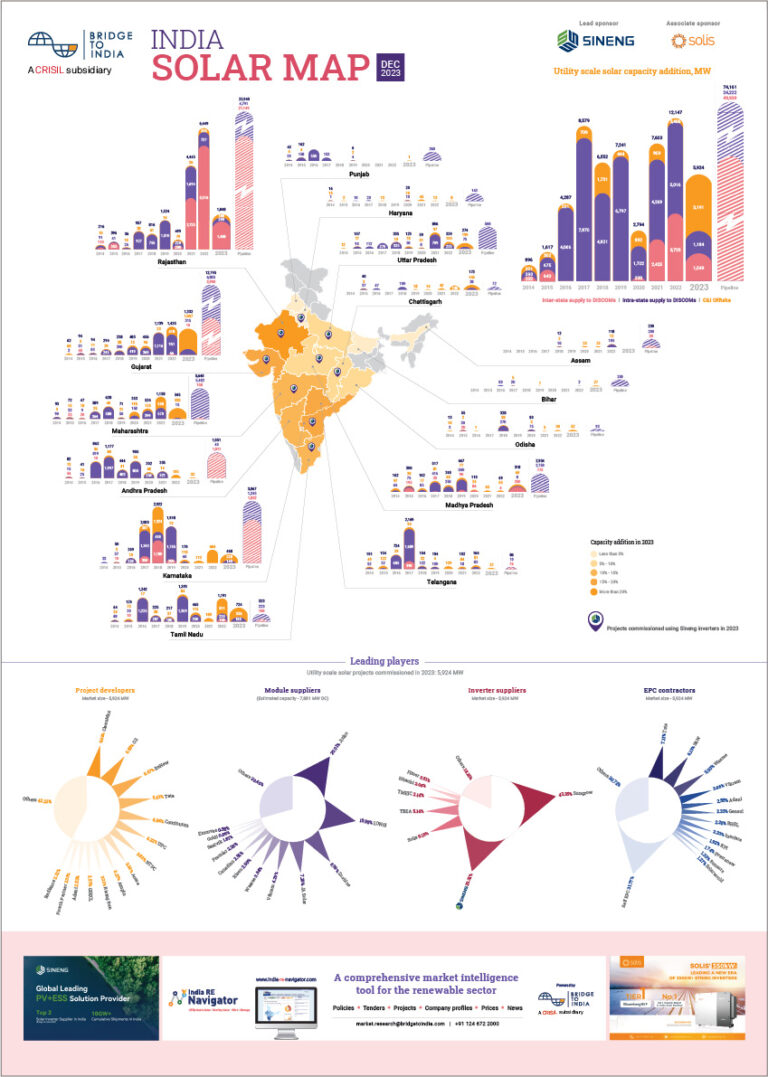The Tamil Nadu State Solar Policy (TNSSP) aims at achieving 500 MW till 2015 through the Solar Power Obligations (SPOs) mechanism (Read BRIDGE TO INDIA’s policy brief on Tamil Nadu for the complete analysis on the policy). SPOs are enforced on High Tension (HT) consumers of power (>33KV). This implies that HT consumers are obligated to purchase a certain percentage of their total power from solar. The SPO is fixed at 3% of total energy consumption until December 2013 and 6% from January 2014. While Tamil Nadu is the first state in the country to announce specific SPOs, they appear to be in conflict with the existing national Renewable Purchase Obligations (RPO) announced by the Central Electricity Regulatory Commission (CERC). According to the CERC, RPOs will be enforced on distribution companies (DISCOMS), captive consumers and open access consumers across the country. The SPOs are enforced on HT consumers.
- Regulatory conflicts arise due to the RPOs from the CERC and the SPOs from the state
- This conflict is a likely indicator of a larger trend in the Indian solar industry, where solar power is getting politically decentralized
- SPOs have a higher likelihood to be enforced given that the DISCOMs have the authority to monitor and enforce SPOs
SPOs can be fulfilled by one of the following options:
- Generating captive solar power in Tamil Nadu equivalent to or more than their SPO
- Buying solar power equal to or greater than the specified SPO from other third party developers of solar power projects in Tamil Nadu
- Buying renewable energy certificates (RECs) generated by solar power projects in Tamil Nadu equivalent to or more than their SPO
- Purchasing power from the Tamil Nadu Generation and Distribution Corporation (TANGEDCO) at a solar tariff
There are two unanswered questions that arise from the conflict between RPO and SPO regulations:
- Can solar plants that meet SPOs generate RECs? As per the CERC’s RPO-REC regulations this should be allowed, given that the power generated is not being used to meet RPO obligations of any entity.
- Why do SPO obligated entities have to purchase RECs generated from solar power projects only in Tamil Nadu? The REC market is a national market that allows states without adequate solar resource to purchase solar RECs from those states that have adequate solar resource. Effectively, Tamil Nadu will have to set up its own REC market.
The dynamics of India’s solar industry are changing – fast. Reading between the lines, one observes:
- Solar is getting politically decentralized. States are clearly choosing to override or ignore national regulations. Earlier Andhra Pradesh announced waivers in taxes, fees and duties for REC projects, which go against the regulations from CERC. This can seriously jeopardize the entire national REC market. On the up-side, RPO enforcements are likely to be more stringent since DISCOMs will implement and enforce them.
- The introduction of SPOs could potentially be a strategy to offload the RPO burden onto HT consumers of power that constitute roughly 46% of the power demand. This is a good idea given the poor financial health of most DISCOMs in the country.
- SPOs will also see more distributed power in form of captive/roof-top systems. This will go a long way in reducing the overall power demand in Tamil Nadu, which is experiencing a peak power deficit of 17.5%.












